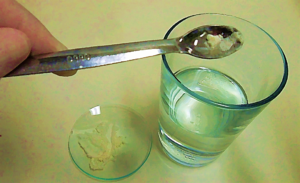Aspartame and thyroid autoimmunity
Aspartame is an artificial sweetener used since 1980s. It was made accidently in 1965 by James M. Schlatter while doing a research in a laboratory. It is therefore not a naturally occurring substance. It is commonly known as NutraSweet, Equal, NatraTaste Blue or number E951. There are many other artificial sweeteners but I will focus on aspartame in this blog. Aspartame is about 200 times sweeter than sugar so very little is needed to achieve the same sweetness as sugar. It is approved for human consumption by FDA and is present in thousands of products including common diet soft drinks, chewing gums, vitamins, some medications (even sugar free cough lozenges) and many other foods ( jellies, confectionary, desserts, yoghurts).
While we all know that high sugar diet is bad for us but what about aspartame?
There is a controversy about the safety of aspartame and the efficacy of aspartame studies. Aspartame breaks down to toxic products in the body. The products are phenylalanine, aspartic acid, methanol (which is then metabolised to a neurotoxin formaldehyde and formic acid). The amounts generally consumed by people are believed to be acceptable and safe. However, as a scientist who worked on DNA, I can tell you that methanol and formaldehyde are still mutagenic substances. Aspartame contains aspartic acid and amino acid phenylalanine, which our body can convert to tyrosine, a building block or thyroid hormone and other hormones. Aspartic acid is a nerve cell stimulant. Even though aspartic acid and phenylalanine occur naturally in protein food, they do not occur by themselves but are balanced with other amino acids. There is a observational study linking consumption of diet soda daily was associated with significantly greater risks of select incident metabolic syndrome components and type 2 diabetes (1). Another scientific study linked consumption of artificial sweeteners with obesity (3). There are many other diseases possibly linked to aspartame consumption (6, 7).
The article published in The American Journal of Industrial medicine in 2014 urges for urgent need for regulatory evaluation of Aspartame and raises serious questions about its safety for human consumption and possible link to cancer development. “On the basis of the evidence of the potential carcinogenic effects of APM herein reported, a re-evaluation of the current position of international regulatory agencies must be considered an urgent matter of public health.”
Even though I will focus on thyroid autoimmunity in this blog, it is important to mention the questions raised about aspartame as our body works as a whole system and to focus on thyroid alone would be irrational.
In my opinion, the research on thyroid autoimmunity and aspartame is insufficient to properly establish a definite link between thyroid autoimmunity and aspartame. Larger population studies would be needed and beneficial. The link between aspartame and GD is not proven as such so far. However Dr. H. J. Roberts described cases of aspartame-related Graves’ disease in four weight-conscious women with hyperthyroidism who had experienced dramatic remissions within several weeks to 3 months of avoiding aspartame. He also had noticed that four other women who had been treated previously for Graves’ disease developed symptoms after beginning aspartame consumption and their symptoms subsided after cessation (4, 5). The power of observation is important and it is great that Dr Roberts is putting those issues into a light and raising questions. Artificial sweeteners were also tentatively linked to Hashimoto’s thyroiditis (8). Dr Janet Starr Hull, managed to cure herself of Graves’ disease by detoxifying from aspartame (10). Those correlations have been noticed by nutritionists as well. It is therefore best to avoid aspartame for people with thyroid autoimmunity. Having regular food and drinks containing aspartame may contribute to thyroid autoimmune illness.
Some individuals may be more sensitive to aspartame damage and may include pregnant women, growing foetus, children and older people who might not tolerate it well. For people with the disease phenylketonuria, ingesting aspartame may cause damage to their brain.
How do you then satisfy your sweet tooth and stay healthy? Limiting sugar is important, especially the white and refined sugar.
I can only talk about my personal choices only. I am not a dietician but I do not like including anything artificial in my food. I made my personal choices in regards to sugar and its artificial substitutes. I avoid foods containing high fructose corn syrup. I do not have any diet or sugar free foods with artificial sweeteners. I try hard to limit sugar. In my belief, sugar is inflammatory (especially refined, white) for someone with autoimmunity problems. It should be limited definitely. I stopped using sugar to sweeten my drinks in my twenties. Over time, I got used to that and never looked back. I do not use stevia (plant derived sweetener) as personally, I do not tolerate it well. I bake cakes or biscuits for special occasions and use brown unrefined sugar, coconut sugar in baking but only with less than a third of the recommended amount and limit the amount I eat. Unrefined brown sugar comes from natural sources like sugar beets and cane and not from a laboratory so I believe it is still better in small amounts than artificial sweeteners. I sometimes use small amount of honey, blackstrap molasses or maple syrup in baking also. Blackstrap molasses is a thick, brown liquid which also contains B vitamins, iron, chromium and other minerals. The presence of chromium in blackstrap molasses is very beneficial as chromium deficiency is connected to increased sugar cravings. Maple syrup also contains minerals. Aspartame may deplete chromium nutrient, which is important for hormonal balance and it may make you crave sugar more. Both blackstrap molasses and maple syrup are believed to have some antioxidant and anti-inflammatory qualities. They have a lower glycaemic index than plain sugar. Raw honey is high in sugar but also has antimicrobial and other beneficial properties so it is a better alternative to plain white sugar when used in small amounts.
I had noticed that some tricks can reduce my sugar cravings, which I usually have after dinner. Good adrenal support day formula works well for me if I notice experiencing lots of sugar cravings. Eating something fatty (few nuts or small piece of feta cheese) or sour (pickled or fermented vegetables) after a main meal has helped me personally. The trick for me is to be strong and wait 10-15 minutes after that and the craving go away. A teaspoon of apple cider vinegar in some water before a meal also lowers my blood sugar and helps. Including foods containing chromium and B vitamins in your diet such as some Brewer’s yeast helps with sugar cravings. Also, having lots of green, organic salads every day help with sugar cravings as they provide plenty of minerals such as potassium and magnesium which support adrenal glands. Finally, a small piece of dark 70-80% chocolate with unsweetened coffee helps me if everything else fails. Naturally decaffeinated, organic coffee would be better for people with Graves’ disease. Dealing with sugar cravings and emotions may help some. Emotional freedom technique (tapping on some acupuncture points) is a gentle technique that may be useful.
Please note my blogs are for educational purposes only.
Bibliography
- Jennifer A. Nettleton, PHD, Pamela L. Lutsey, PHD, Youfa Wang, MD, PHD, João A. Lima, PHD, Erin D. Michos, MD and David R. Jacobs, Jr., PHD. Diet Soda Intake and Risk of Incident Metabolic Syndrome and Type 2 Diabetes in the Multi-Ethnic Study of Atherosclerosis (MESA). Diabetes Care 2009 Apr; 32(4): 688-694.
- Morando Soffritti, MD, Michela Padovani, MPH, Eva Tibaldi, PhD, Laura Falcioni, DMV, Fabiana Manservisi, PhD and Fiorella Belpoggi, PhD. The carcinogenic effects of aspartame: The urgent need for regulatory re-evaluation. American Journal of Industrial Medicine. 2014: 57(4):383-397.
- Endocrine Society. Low-calorie sweeteners promote fat accumulation in human fat. April 03, 2017. URL: https://www.endocrine.org/news-room/current-press-releases/low-calorie-sweeteners-promote-fat-accumulation-in-human-fat
- J. Roberts, MD, FACP, FCCP. Aspartame Disease. A Possible Cause for Concomitant Graves’ Disease and Pulmonary Hypertension. Tex Heart Inst J. 2004; 31(1): 105
- Roberts HJ. Aspartame and hyperthyroidism: a presidential affliction reconsidered. Townsend Letter for Doctors & Patients 1997; May: 86–8.
- http://www.blatantpropaganda.org/propaganda/articles/is-aspartame-a-dangerous-toxic-poison-doctors-link-it-to-diseases-illnesses.html
- https://www.livescience.com/36257-aspartame-health-effects-artificial-sweetener.html
- 22nd Annual Scientific & Clinical Congress of the American Association of Clinical Endocrinologists: Hashimoto’s Hypothyroidism Induced by Artificial Sweeteners. https://www.endocrineweb.com/professional/meetings/hashimotos-hypothyroidism-induced-artificial-sweeteners
- http://articles.mercola.com/sites/articles/archive/2011/08/03/just-how-bad-is-aspartame.aspx
- Janet Starr Hull. Sweet Poison. New Horizon Press. 1999. USA.


I consumed a lot of diet soda, daily. My TSH, while treated (3 years) for hypothyroidism, never stabilized or reached normal. At my last testing my TSH was just above 30. I decided to quit the diet soda and see if that would make any difference in my TSH level.
After 2 months my TSH dropped to about 15. Then, after 3 months my TSH dropped to about 9. Finally, after 4 months off the diet soda, my TSH level came in at 1.3 (while taking 125 mcg Levothyroxine throughout all 3 testing periods, with no dosage change. I had been at that same dosage for almost 1 year).
I will report back the final results. I am curious to see if the antibodies will return to normal as well, and if I will be able to get off the medications entirely. However, this takes a little time. I am looking at a year, possibly, to wean off the medication.
I would be inclined to attest that yes, diet soda does have an effect on the thyroid function.
Hi Steve,
Thank you for your comment. Sorry it took so long to reply. It is great to hear that quitting soda made a difference to your health.
Best regards
Jolanta Krywult